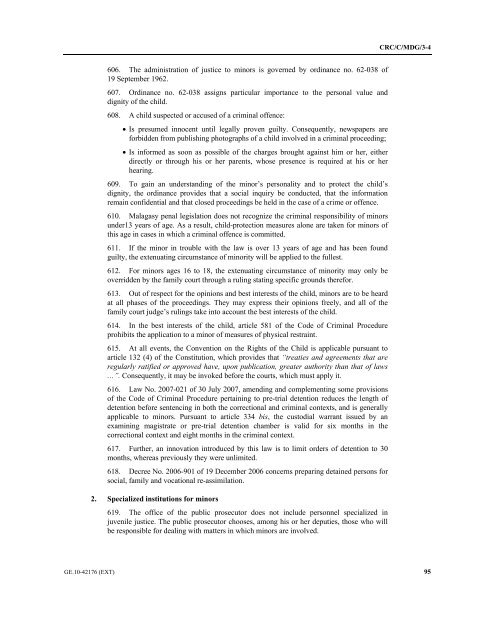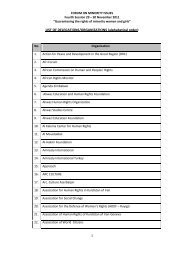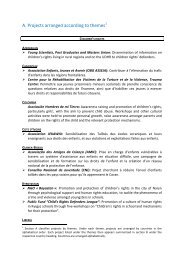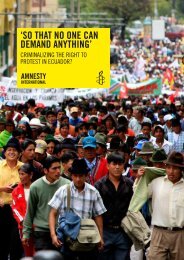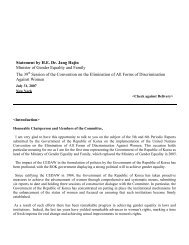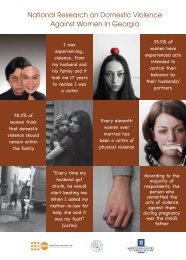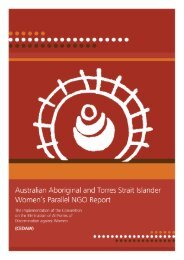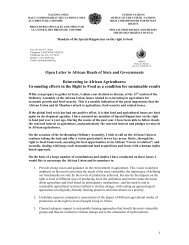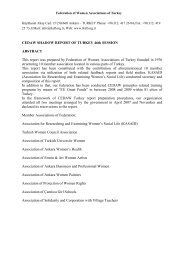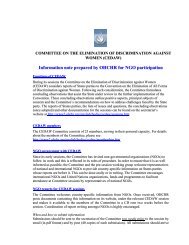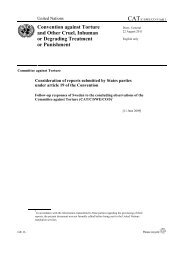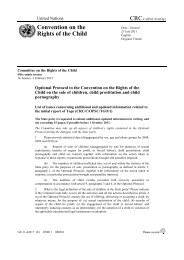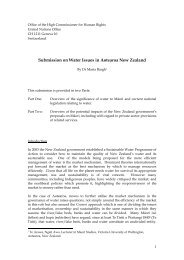CRC/C/MDG/3-4 - Office of the High Commissioner for Human Rights
CRC/C/MDG/3-4 - Office of the High Commissioner for Human Rights
CRC/C/MDG/3-4 - Office of the High Commissioner for Human Rights
Create successful ePaper yourself
Turn your PDF publications into a flip-book with our unique Google optimized e-Paper software.
606. The administration <strong>of</strong> justice to minors is governed by ordinance no. 62-038 <strong>of</strong><br />
19 September 1962.<br />
607. Ordinance no. 62-038 assigns particular importance to <strong>the</strong> personal value and<br />
dignity <strong>of</strong> <strong>the</strong> child.<br />
608. A child suspected or accused <strong>of</strong> a criminal <strong>of</strong>fence:<br />
• Is presumed innocent until legally proven guilty. Consequently, newspapers are<br />
<strong>for</strong>bidden from publishing photographs <strong>of</strong> a child involved in a criminal proceeding;<br />
• Is in<strong>for</strong>med as soon as possible <strong>of</strong> <strong>the</strong> charges brought against him or her, ei<strong>the</strong>r<br />
directly or through his or her parents, whose presence is required at his or her<br />
hearing.<br />
609. To gain an understanding <strong>of</strong> <strong>the</strong> minor’s personality and to protect <strong>the</strong> child’s<br />
dignity, <strong>the</strong> ordinance provides that a social inquiry be conducted, that <strong>the</strong> in<strong>for</strong>mation<br />
remain confidential and that closed proceedings be held in <strong>the</strong> case <strong>of</strong> a crime or <strong>of</strong>fence.<br />
610. Malagasy penal legislation does not recognize <strong>the</strong> criminal responsibility <strong>of</strong> minors<br />
under13 years <strong>of</strong> age. As a result, child-protection measures alone are taken <strong>for</strong> minors <strong>of</strong><br />
this age in cases in which a criminal <strong>of</strong>fence is committed.<br />
611. If <strong>the</strong> minor in trouble with <strong>the</strong> law is over 13 years <strong>of</strong> age and has been found<br />
guilty, <strong>the</strong> extenuating circumstance <strong>of</strong> minority will be applied to <strong>the</strong> fullest.<br />
612. For minors ages 16 to 18, <strong>the</strong> extenuating circumstance <strong>of</strong> minority may only be<br />
overridden by <strong>the</strong> family court through a ruling stating specific grounds <strong>the</strong>re<strong>for</strong>.<br />
613. Out <strong>of</strong> respect <strong>for</strong> <strong>the</strong> opinions and best interests <strong>of</strong> <strong>the</strong> child, minors are to be heard<br />
at all phases <strong>of</strong> <strong>the</strong> proceedings. They may express <strong>the</strong>ir opinions freely, and all <strong>of</strong> <strong>the</strong><br />
family court judge’s rulings take into account <strong>the</strong> best interests <strong>of</strong> <strong>the</strong> child.<br />
614. In <strong>the</strong> best interests <strong>of</strong> <strong>the</strong> child, article 581 <strong>of</strong> <strong>the</strong> Code <strong>of</strong> Criminal Procedure<br />
prohibits <strong>the</strong> application to a minor <strong>of</strong> measures <strong>of</strong> physical restraint.<br />
615. At all events, <strong>the</strong> Convention on <strong>the</strong> <strong>Rights</strong> <strong>of</strong> <strong>the</strong> Child is applicable pursuant to<br />
article 132 (4) <strong>of</strong> <strong>the</strong> Constitution, which provides that “treaties and agreements that are<br />
regularly ratified or approved have, upon publication, greater authority than that <strong>of</strong> laws<br />
…”. Consequently, it may be invoked be<strong>for</strong>e <strong>the</strong> courts, which must apply it.<br />
616. Law No. 2007-021 <strong>of</strong> 30 July 2007, amending and complementing some provisions<br />
<strong>of</strong> <strong>the</strong> Code <strong>of</strong> Criminal Procedure pertaining to pre-trial detention reduces <strong>the</strong> length <strong>of</strong><br />
detention be<strong>for</strong>e sentencing in both <strong>the</strong> correctional and criminal contexts, and is generally<br />
applicable to minors. Pursuant to article 334 bis, <strong>the</strong> custodial warrant issued by an<br />
examining magistrate or pre-trial detention chamber is valid <strong>for</strong> six months in <strong>the</strong><br />
correctional context and eight months in <strong>the</strong> criminal context.<br />
617. Fur<strong>the</strong>r, an innovation introduced by this law is to limit orders <strong>of</strong> detention to 30<br />
months, whereas previously <strong>the</strong>y were unlimited.<br />
618. Decree No. 2006-901 <strong>of</strong> 19 December 2006 concerns preparing detained persons <strong>for</strong><br />
social, family and vocational re-assimilation.<br />
2. Specialized institutions <strong>for</strong> minors<br />
619. The <strong>of</strong>fice <strong>of</strong> <strong>the</strong> public prosecutor does not include personnel specialized in<br />
juvenile justice. The public prosecutor chooses, among his or her deputies, those who will<br />
be responsible <strong>for</strong> dealing with matters in which minors are involved.<br />
<strong>CRC</strong>/C/<strong>MDG</strong>/3-4<br />
GE.10-42176 (EXT) 95


